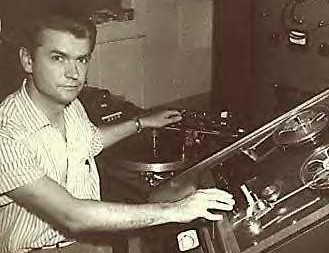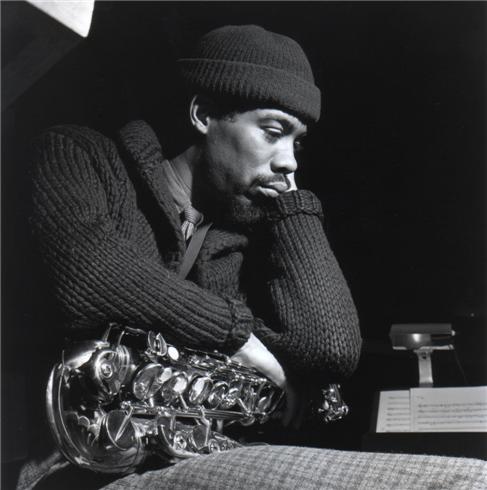April 22: The late Charles Mingus was born in 1922
Continue reading April 22: The late Charles Mingus was born in 1922
Continue reading April 22: The late Charles Mingus was born in 1922
 |
Sam Phillips was not just one of the most important producers in rock history. There’s a good argument to be made that he was also one of the most important figures in 20th century American culture. ~Richie Unterberger (allmusic.com) If you’re not doing something different, you’re not doing anything. |
| Great Sam Phillips documentary in two parts(Host: Billy Bob Thornton): |
|
Continue reading Jan 05: The late Sam Phillips was born in 1923

When you hear music, after it’s over, it’s gone, in the air. You can never capture it again.
~Eric DolphyEric Dolphy was a true original with his own distinctive styles on alto, flute, and bass clarinet. His music fell into the “avant-garde” category yet he did not discard chordal improvisation altogether..
~Scott Yanow (allmusic.com)
Charles Mingus Sextet featuring Eric Dolphy Take The A Train (Live, Norway 1964):
Continue reading June 29: Eric Dolphy passed away 50 years ago today
Just because I’m playing jazz I don’t forget about me. I play or write me the way I feel through jazz, or whatever. Music is, or was, a language of the emotions.
~Charles MingusAnyone can make the simple complicated. Creativity is making the complicated simple.
~Charles MingusIrascible, demanding, bullying, and probably a genius, Charles Mingus cut himself a uniquely iconoclastic path through jazz in the middle of the 20th century, creating a legacy that became universally lauded only after he was no longer around to bug people.
~Richard S. Ginell (allmusic.com)
Goodbye Pork Pie Hat – Live at Montreux 1975:
Wikipedia:
| Birth name | Charles Mingus Jr. |
|---|---|
| Born | April 22, 1922 US Army Base in Nogales, Arizona, United States |
| Origin | Los Angeles, California, United States |
| Died | January 5, 1979 (aged 56) Cuernavaca, Mexico |
| Genres | Jazz, hard bop, bebop, avant-garde jazz, post-bop, Third Stream, gospel, orchestral jazz, free jazz |
| Occupations | Double bassist, composer, bandleader |
| Instruments | Double bass, piano, cello, trombone |
| Years active | 1943–1979 |
Charles Mingus Jr. (April 22, 1922 – January 5, 1979) was a highly influential American jazz double bassist, composer and bandleader. Mingus’s compositions retained the hot and soulful feel of hard bop and drew heavily from black gospel music while sometimes drawing on elements of Third Stream, free jazz, and classical music. Yet Mingus avoided categorization, forging his own brand of music that fused tradition with unique and unexplored realms of jazz. He once cited Duke Ellington and church as his main influences.
Mingus focused on collective improvisation, similar to the old New Orleans jazz parades, paying particular attention to how each band member interacted with the group as a whole. In creating his bands, Mingus looked not only at the skills of the available musicians, but also their personalities. Many musicians passed through his bands and later went on to impressive careers. He recruited talented and sometimes little-known artists whom he assembled into unconventional and revealing configurations. As a performer, Mingus was a pioneer in double bass technique, widely recognized as one of the instrument’s most proficient players.
Charles Mingus Sextet featuring Eric Dolphy – Take The A Train (Live in Oslo – Norway 1964):
Nearly as well known as his ambitious music was Mingus’ often fearsome temperament, which earned him the nickname “The Angry Man of Jazz”. His refusal to compromise his musical integrity led to many on-stage eruptions, exhortations to musicians, and dismissals. Because of his brilliant writing for mid-size ensembles, and his catering to and emphasizing the strengths of the musicians in his groups, Mingus is often considered the heir of Duke Ellington, for whom he expressed great admiration. Indeed, Dizzy Gillespie had once claimed Mingus reminded him “of a young Duke”, citing their shared “organizational genius”.
Mingus’ music was once believed to be too difficult to play without Mingus’ leadership. However, many musicians play Mingus compositions today, from the repertory bands Mingus Big Band, Mingus Dynasty, and Mingus Orchestra, to the high school students who play the charts and compete in the Charles Mingus High School Competition.
Orange Was The Color Of Her Dress, Then Blue Silk (Live in Oslo 1964):
Gunther Schuller has suggested that Mingus should be ranked among the most important American composers, jazz or otherwise. In 1988, a grant from the National Endowment for the Arts made possible the cataloging of Mingus compositions, which were then donated to the Music Division of the New York Public Library for public use. In 1993, The Library of Congress acquired Mingus’s collected papers—including scores, sound recordings, correspondence and photos—in what they described as “the most important acquisition of a manuscript collection relating to jazz in the Library’s history”.
“Mingus: Charlie Mingus 1968” (Thomas Reichman documentary) – 58min:
Continue reading Today: The late Charles Mingus was born in 1922 – 91 years ago
Charles Mingus Jr. (April 22, 1922 – January 5, 1979) was an American jazz musician, composer, bandleader, and civil rights activist.
Mingus’s compositions retained the hot and soulful feel of hard bop and drew heavily from black gospel music while sometimes drawing on elements of Third stream, free jazz, and classical music. Yet Mingus avoided categorization, forging his own brand of music that fused tradition with unique and unexplored realms of jazz.
Mingus focused on collective improvisation, similar to the old New Orleans jazz parades, paying particular attention to how each band member interacted with the group as a whole. In creating his bands, Mingus looked not only at the skills of the available musicians, but also their personalities. Many musicians passed through his bands and later went on to impressive careers. He recruited talented and sometimes little-known artists whom he assembled into unconventional and revealing configurations. As a performer, Mingus was a pioneer in double bass technique, widely recognized as one of the instrument’s most proficient players. (wikipedia)
Goodbye Pork Pie Hat, Montreux 1975:
other 22 April.
Continue reading Today: Charles Mingus was born in 1922